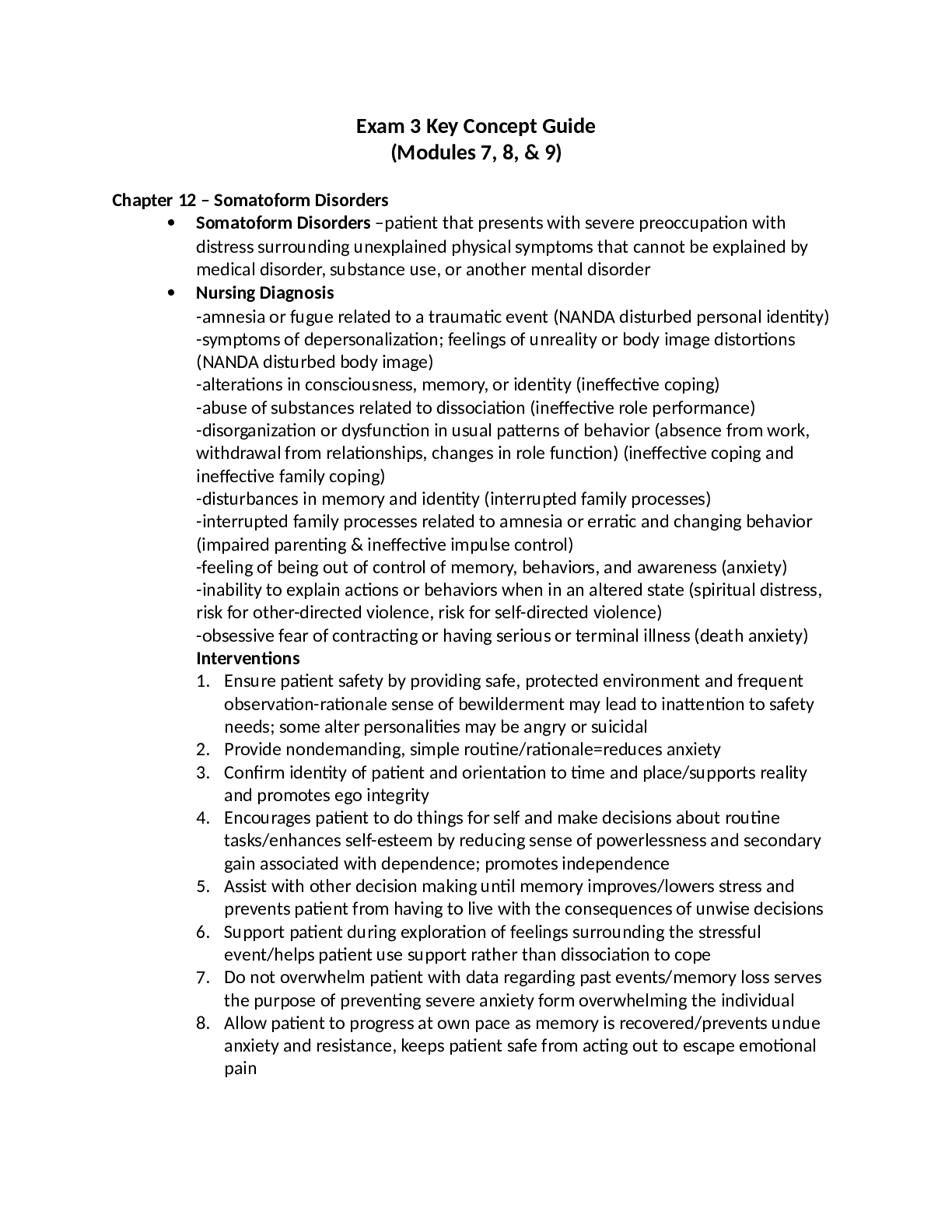Chapter 12– Somatoform Disorders
Somatoform Disorders –patient that presents with severe preoccupation with
distress surrounding unexplained physical symptoms that cannot be explained by
medical disorder, substance use, or another mental disorder
Nursing Diagnosis
-amnesia or fugue related to a traumatic event (NANDA disturbed personal identity)
-symptoms of depersonalization; feelings of unreality or body image distortions
(NANDA disturbed body image)
-alterations in consciousness, memory, or identity (ineffective coping)
-abuse of substances related to dissociation (ineffective role performance)
-disorganization or dysfunction in usual patterns of behavior (absence from work,
withdrawal from relationships, changes in role function) (ineffective coping and
ineffective family coping)
-disturbances in memory and identity (interrupted family processes)
-interrupted family processes related to amnesia or erratic and changing behavior
(impaired parenting & ineffective impulse control)
-feeling of being out of control of memory, behaviors, and awareness (anxiety)
-inability to explain actions or behaviors when in an altered state (spiritual distress,
risk for other-directed violence, risk for self-directed violence)
-obsessive fear of contracting or having serious or terminal illness (death anxiety)
Interventions
1. Ensure patient safety by providing safe, protected environment and frequent
observation-rationale sense of bewilderment may lead to inattention to safety
needs; some alter personalities may be angry or suicidal
2. Provide nondemanding, simple routine/rationale=reduces anxiety
3. Confirm identity of patient and orientation to time and place/supports reality
and promotes ego integrity
4. Encourages patient to do things for self and make decisions about routine
tasks/enhances self-esteem by reducing sense of powerlessness and secondary
gain associated with dependence; promotes independence
5. Assist with other decision making until memory improves/lowers stress and
prevents patient from having to live with the consequences of unwise decisions
6. Support patient during exploration of feelings surrounding the stressful
event/helps patient use support rather than dissociation to cope
7. Do not overwhelm patient with data regarding past events/memory loss serves
the purpose of preventing severe anxiety form overwhelming the individual
8. Allow patient to progress at own pace as memory is recovered/prevents undue
anxiety and resistance, keeps patient safe from acting out to escape emotional
pain
9. Provide support during disclosures of painful experiences/can be healing while
minimizing feelings of isolation
10. Accept patient’s expression of negative feelings/conveys permission to have
negative or unacceptable feelings
11. Teach stress reduction methods/provides alternative for anxiety relief
Secondary gains
- Benefits derived from the symptoms alone like for example in the sick role, the patient is
not able to perform normal family, work, and social functions and receives extra
attention from loved ones
- Ask patient questions like: what abilities have you lost since the development of your
symptoms? How has this problem affected your life? Are there things you can no longer
do? Depending upon the individual patient and your rapport, the nurse might gently
approach whether anything positive is obtained because of the disorder.
Hypochondriasis - signs/symptoms
-may or may not present with somatic symptoms, if they do, usually mild
-high level of anxiety and alarm about their health lasting at least 6 months
-may either excessively check for problems or avoid medical care
-preoccupation with health leads to an encompassing anxiety that severely impairs
functioning
-can misinterpret normal physical sensations such as sweating, abdominal cramping
or awareness of heartbeat as indicative disease
-client may seek medical treatment form numerous health care providers
-client continues to have anxiety despite negative disgnositc tests and reassurance
from the provider
-research their suspected diseases excessively and examine themselves repeatedly
Conversion Disorder – define and nursing interventions
Definition- aka Functional Neurobiological Symptom Disorder
-presents with one or more symptoms of impaired motor or sensory function
-findings are incompatible with or an exaggeration of recognized neurological
conditions and are not better explained by another mental or medical disorder
-symptoms include: weakness or paralysis, abnormal movement, swallowing or
speech difficulties, seizures or attacks, sensory loss or anesthesia or symptoms
involving the senses
Nursing Interventions-
-build rapport and trust with clients
-ensure safety
-encourage verbalization of feelings
-educate client on alternative coping mechanisms
-educate client on stress management techniques
-understand the incidence of remissions and recurrence (remission occurs without
intervention in approximately 95% of clients)
Dissociative Fugue
-dissociative fugue is related to a traumatic incident where the patient flees form
their normal life to another location and starts a new life, gradually over time,
memories from the original life may be triggered
-Nursing Interventions
-ensure patient safety by providing safe, protected environment and frequent
observation
-provide nondemanding simple routines
-confirm identity of patient and orientation to time and place
-encourage patient to do things for self and make decisions about routine tasks
-support patient during exploration of feelings surrounding the stressful events
-allow patient to progress at own pace as memory is recovered
-provide support during disclosure of painful experiences
-accept patient’s expression of negative feelings
-teach stress reduction methods
Body Dysmorphic Disorder – Care Plan; Highest Priority
-when a person sincerely believes that their body is flawed but to others the
imperfection is so minute, the person may not go to social functions due to this
belief (social isolation), often either checks self in mirrors frequently or abstains from
looking in mirrors
Nursing Diagnosis
-Chronic low self-esteem
-Disturbed body image
-Disturbed personal identity
-Impaired social interaction
-Ineffective coping
-Ineffective health maintenance
-Risk for suicide
-Social isolation
Read More

